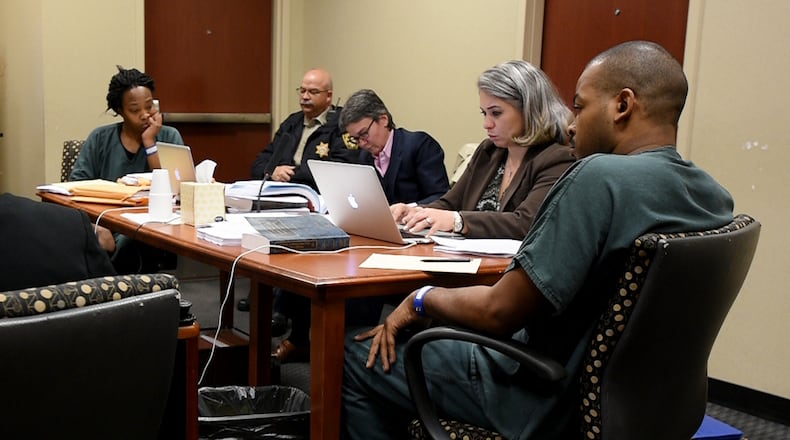A psychiatrist testified on behalf of a former Georgia Tech football star and his wife Wednesday that a judge could do their 10 children serious psychological harm if he permanently separated them from their parents.
Recardo and Therian Wimbush are fighting the state’s attempt in Gwinnett County Juvenile Court to sever their parental rights after they were charged with felony child abuse.
The unusual case began in June when social workers investigated a report that the Wimbushes, who home schooled their children in their house near Buford, had imprisoned their oldest child in a basement room for months.
The room lacked artificial light and had only a window that provided limited light, according to state authorities. The Wimbushes said the boy was being disciplined and was getting regular meals and daily interaction with his parents and at times his siblings.
The couple has been jailed with no bond since last summer after prosecutors argued they might influence their children’s testimony before a separate and still unscheduled trial on felony child abuse charges.
Isolating their child in the basement was improper discipline, but the Wimbushes were struggling for a solution that would both teach the child stealing and lying was wrong and also protect their other children from him because of his behavior, psychiatrist Sarah Vinson said.
“They are very much parents who want to help their kids, who love their kids,” Vinson told The Atlanta Journal-Constitution after the hearing. “They made one very bad decision that got dramatic attention.”
The courts and the state Division of Family and Children Services had circumvented their normal rules that require the department to strive to keep families together, Vinson said.
Therian Wimbush took the reins of the hearing after firing her attorney, Alex Manning, at the start of it. She questioned state social worker Angela Jackson on whether the children were following their dietary restrictions and the beliefs of the family’s personalized religion that is based on the Torah. The beliefs include not following Christian holidays or certain state holidays, such as Thanksgiving, and practicing a kosher diet.
Gwinnett Juvenile Judge Robert Rodatus expressed frustration, pointing out that other than studying the first books of the Bible, that there was no authority for the Wimbushes’ religious beliefs.
Then Wimbush questioned Jackson about her children’s behavior and scholarship — which further annoyed the judge.
“I already told you that I found your children to be very bright, well-rounded and polite,” Rodatus said. “They are all very well educated.”
“My point here is that there have been a lot allegations that these children were not well-rounded and isolated,” Wimbush said.
“What we need to be focused on is there should there be a plan for you to be reunified with your children” Rodatus said. “None of this goes to that.”
“I think this all lends itself to the parenting,” Wimbush said.
The case is to resume Thursday, after which Rodatus is expected to possibly rule on whether the close-knit family unit will be broken apart and permanently placed with estranged relatives in Florida and Georgia.
Both sides have been making their case to Rodatus for months in a series of hearings. In March, a psychologist hired by DFCS testified reuniting the children was high risk, even though the couple had no history of violence, because they believed locking up a child for months was proper rehabilitation.
“I think reunification would be very high risk and problematic without any acknowledgment of wrongdoing,” said psychologist Priscilla Faulkner.
The Wimbushes say they’re being persecuted for raising their children in line with their own unusual religious beliefs and because they maintain a close-knit clan to protect their kids from societal influences. The couple married while at Georgia Tech where Recardo, 33, was an athletic star, and Therian, 37, earned an advanced engineering degree and tutored athletes. Later, Recardo became a supervisor at railroad company, while Therian focused on home-schooling her growing family of children ages — 2 to 14 — and professional tutoring.
Faulkner acknowledged that testing of the children showed they were at proper academic levels and they had no behavioral problems.
Authorities — social workers, judges and prosecutors — have voiced heightened concern from the start of the case, saying the Wimbushes were high-functioning adults but ones who had an abnormal and bizarre view of parenting.
About the Author
The Latest
Featured


